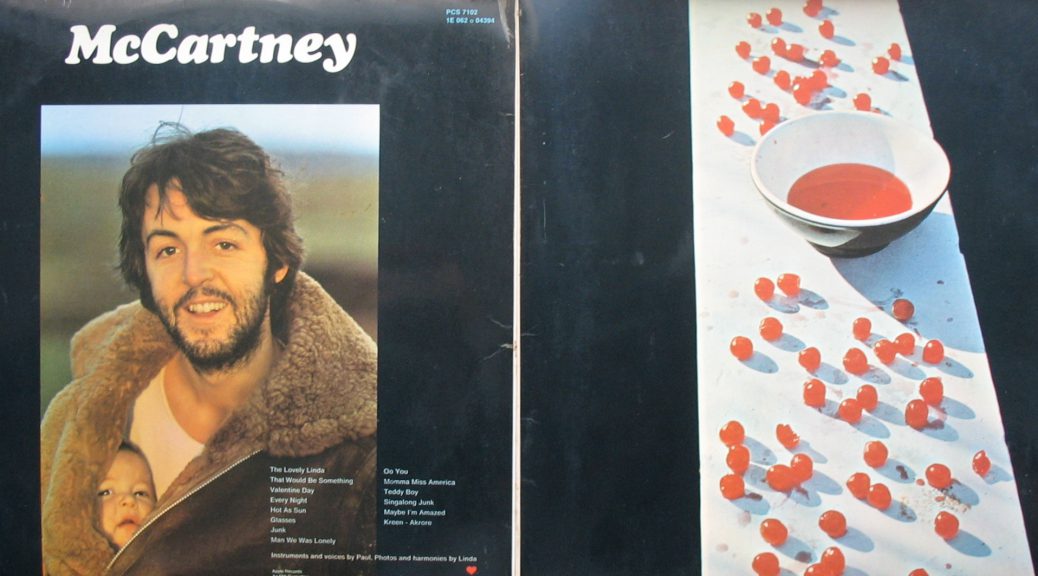April 20 Peace Love Art Activism
BLACK HISTORY
Slave Revolts
April 20 (Easter), 1710: another Virginia conspiracy in the same area as 1709—perhaps inspired by Peter and involving only African American slaves—was to have begun on Easter 1710. A slave named Will, however, betrayed it to authorities. Will got his freedom and his owner Robert Ruffin was reimbursed for his value with £40 of public money. Two of the plot’s leaders were tried by the General Court, convicted, and executed. Wrote Governor Edmund Jennings in his report to the London Lords of Trade, “I hope their fate will strike such terror in the other negroes as will keep them from forming such designs for the future, without being obliged to make an example of any more of them.” (see April 6, 1712)
Civil Rights Act of 1871
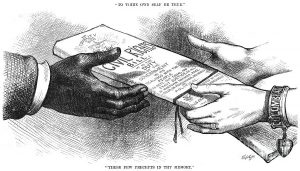
April 20, 1871: President Ulysses S. Grant signed the Enforcement Act of 1871. The Act has several other names: Civil Rights Act of 1871, Force Act of 1871, Ku Klux Force Act, Ku Klux Klan Act, Third Enforcement Act, or Third Ku Klux Klan Act. The act empowered the President to suspend the writ of habeas corpus to combat the Ku Klux Klan (KKK) and other white supremacy organizations during the Reconstruction Era. (Federal Judicial Center article) (BH, see Oct 10;Terrorism, see Oct 12)
Nelson Mandela
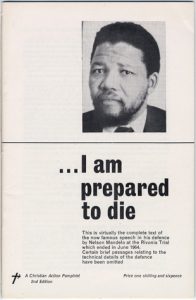
April 20, 1964, Mandela delivered his famous “I am prepared to die” speech while on trial.
[exerpt] “Africans want to be paid a living wage. Africans want to perform work which they are capable of doing, and not work which the Government declares them to be capable of. We want to be allowed to live where we obtain work, and not be endorsed out of an area because we were not born there. We want to be allowed and not to be obliged to live in rented houses which we can never call our own. We want to be part of the general population, and not confined to living in our ghettoes. African men want to have their wives and children to live with them where they work, and not to be forced into an unnatural existence in men’s hostels. Our women want to be with their men folk and not to be left permanently widowed in the reserves. We want to be allowed out after eleven o’clock at night and not to be confined to our rooms like little children. We want to be allowed to travel in our own country and to seek work where we want to, where we want to and not where the Labour Bureau tells us to. We want a just share in the whole of South Africa; we want security and a stake in society.
Above all, My Lord, we want equal political rights, because without them our disabilities will be permanent. I know this sounds revolutionary to the whites in this country, because the majority of voters will be Africans. This makes the white man fear democracy.
But this fear cannot be allowed to stand in the way of the only solution which will guarantee racial harmony and freedom for all. It is not true that the enfranchisement of all will result in racial domination. Political division, based on colour, is entirely artificial and, when it disappears, so will the domination of one colour group by another. The ANC has spent half a century fighting against racialism. When it triumphs as it certainly must, it will not change that policy.
This then is what the ANC is fighting. Our struggle is a truly national one. It is a struggle of the African people, inspired by our own suffering and our own experience. It is a struggle for the right to live.
During my lifetime I have dedicated my life to this struggle of the African people. I have fought against white domination, and I have fought against black domination. I have cherished the ideal of a democratic and free society in which all persons will live together in harmony and with equal opportunities. It is an ideal for which I hope to live for and to see realised. But, My Lord, if it needs be, it is an ideal for which I am prepared to die.” (text via Nelson Mandela dot org site) (see June 12)
Swann v. Charlotte-Mecklenburg Board of Education
April 20, 1971: in a 9-0 decision, with the opinion written by Chief Justice Warren Burger, the Supreme Court upheld the use of busing as a “remedial technique” for achieving desegregation. (Oyez article) (BH, see Apr 21; SD, see Aug 30)
Fair Housing
April 20, 1976: in Hills, Secretary of Housing and Urban Development v Gautreaux et al. the US Supreme Court unanimously ruled that Racially discriminatory public housing programs violate the 5th Amendment and Civil Rights Act of 1964, and remedial action to alleviate the effects of such a practice not only is appropriate but also extends beyond city limits to the housing market of the city.
Chicago’s public housing policy had been that a project could go into a neighborhood only with the approval of that neighborhood’s Alderman, which meant that the City Council could and did exclude minorities from white neighborhoods.
In this case, a number of Chicago families living in housing projects were awarded Section 8 vouchers allowing them to move to the suburbs in compensation for the housing project’s substandard conditions. The federal government had challenged that policy. (Justia dot com article) (see October 1977)
Voting Rights
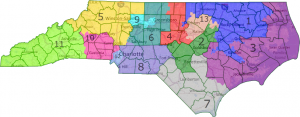
April 20, 2015: the U.S. Supreme Court revived a challenge to North Carolina’s election map, which civil rights groups complained illegally concentrated black voters in a handful of districts.
The North Carolina Supreme Court in December had upheld a redistricting map set by the Republican-controlled state legislature following the 2010 census. But in March, the U.S. Supreme Court reinstated a similar lawsuit against Alabama’s map, which also had previously passed muster with a lower court.
This decision, issued without comment, ordered the North Carolina high court to reconsider its ruling in light of the March opinion. The Alabama ruling required a lower court to consider that packing more minority voters in a district than necessary to give them political strength could violate the Voting Rights Act, by reducing the number of districts where minority voters could wield influence. (see June 29)
BLACK & SHOT
April 20, 2018: three current and former officials said that federal civil rights prosecutors recommended charges against Daniel Pantaleo, the New York police officer involved in the 2014 death of Eric Garner, but top Justice Department officials expressed strong reservations about whether to move forward with a case they say may not be winnable. (B & S, see June 19; Garner, see July 16)
April 20 Peace Love Art Activism
Cultural Milestone
The Murders in the Rue Morgue
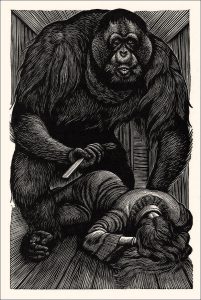
April 20, 1841: Edgar Allen Poe’s, The Murders in the Rue Morgue, first appeared in Graham’s Lady’s and Gentleman’s Magazine. The tale is generally considered to be the first detective story. The story describes the extraordinary “analytical power” used by Monsieur C. Auguste Dupin to solve a series of murders in Paris. Like the later Sherlock Holmes stories, the tale is narrated by the detective’s roommate. (text of story via americanenglishdotstatedotgov) (see August 19, 1846)
April 20 Peace Love Art Activism
US Labor History
Ludlow Massacre
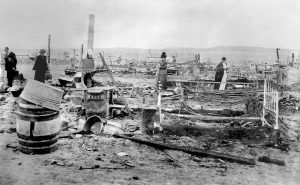
April 20, 1914: Colorado National Guards volley machine-gun fire into the union tent village in Ludlow, Colorado. Tents are set on fire. At least five miners, twelve children and two women are killed. The event leads to a series of demonstrations against the Rockefeller family at their home in Tarrytown, NY, as well as to further violence in Colorado as hundreds of miners take up arms and attack mines. (2014 New Yorker article) (next Anarchism, see Apr 29; LH, see Apr 28; see Goldman for expanded story)
April 20 Peace Love Art Activism
Women’s Health
Emma Goldman
April 20, 1916: Goldman tried at Special Sessions for lecturing on birth control; she is sentenced to fifteen days in Queens County Jail after refusing to pay a $100 fine. (see July 22 for next Anarchism; see Goldman for her expanded chronology)
April 20 Peace Love Art Activism
LSD & the Cold War
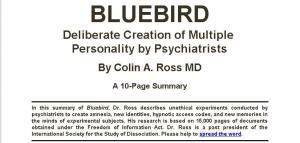
April 20, 1950: the CIA’s behavior-control program project BLUEBIRD officially began. CIA Director Roscoe Hillenkoetter approved the behavior-control program (the predecessor to project ARTICHOKE) and authorized the use of unvouchered funds to pay for its most sensitive areas. At this point, LSD was not known to the CIA. (CIA site article) (LSD, see August; Red Scare, see Apr 29)
April 20 Peace Love Art Activism
Elvis Presley
April 20, 1960: Elvis returned to Hollywood for the first time since coming home from Germany to film G.I. Blues (see April 25 – May 22)
FREE SPEECH
April 20, 1961: the Borough President’s Community Planning Board 2, a semi-official Greenwich Village community planning board, voted to uphold Park Commissioner Newbold Morris’ ban against folk-singing in Washington Square Park. (see NYC Bans for expanded story)
Jazz Samba
April 20, 1962: Stan Getz & Charlie Byrd released Jazz Samba, the first major bossa-nova album on the American jazz scene.
West Side Story
April 20 – May 3, 1963 – West Side Story soundtrack returns as the Billboard #1 album.
L.A. Free Festival
April 20, 1969: the L.A. Free Festival in Venice, CA ended early following an audience riot. 117 arrested. (see LA Free Festival for expanded story)
Paul McCartney
April 20, 1970: the US release of Paul McCartney’s first album. Apart from then-wife Linda’s vocal contributions, he performed and recorded the entire album solo. Featuring loosely arranged (and in some cases, unfinished) home recordings, McCartney further explored the “back-to-basics” style which had been intended for The Beatles’ Let It Be (see May 18)
Side one
- “The Lovely Linda” – 0:45
- “That Would Be Something” – 2:41
- “Valentine Day” – 1:43
- “Every Night” – 2:35
- “Hot as Sun/Glasses” – 2:09
- “Junk” – 1:56
- “Man We Was Lonely” – 3:00
|
Side two
- “Oo You” – 2:50
- “Momma Miss America” – 4:07
- “Teddy Boy” – 2:24
- “Singalong Junk” – 1:56
- “Maybe I’m Amazed” – 3:52
- “Kreen-Akrore” – 4:15
|
April 20 Peace Love Art Activism
Space Race
Surveyor 3
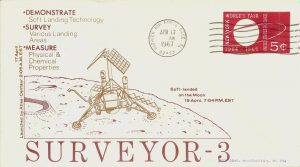
April 20, 1967: the American probe, Surveyor 3, launched on April 17, landed on the Moon at the Mare Cognitum portion of the Oceanus Procellarum. It transmitted a total of 6,315 TV images to the Earth. (2014 Popular Science article) (see Apr 23)
April 20 Peace Love Art Activism
FREE SPEECH
April 20, 1977. In a 6-to-3 decision, the Court held that New Hampshire could not constitutionally require citizens to display the state motto upon their vehicle license plates. Chief Justice Burger, writing for the Court, found that the statute in question effectively required individuals to “use their private property as a ‘mobile billboard’ for the State’s ideological message.” The Court held that the State’s interests in requiring the motto did not outweigh free speech principles under the First Amendment, including “the right of individuals to hold a point of view different from the majority and to refuse to foster. . .an idea they find morally objectionable.” The state’s interest in motor vehicle identification could be achieved by “less drastic means,” and its interest in fostering state pride was not viewpoint-neutral. (next Free Speech, see April 28; see Maynard for expanded story)
Connick v. Myers
April 20, 1983: Connick v. Myers, was a United States Supreme Court decision concerning the First Amendment rights of public employees who speak on matters of possible public concern within the workplace context. It was first brought by Sheila Myers, an Orleans Parish, Louisiana, assistant district attorney (ADA). She had been fired by her superior, District Attorney Harry Connick Sr., when, after receiving a transfer she had fiercely resisted in private conversations with him and his chief assistant district attorney, she distributed a questionnaire to her fellow prosecutors asking about their experience with Connick’s management practices. At trial, Judge Jack Gordon of the Eastern District of Louisiana found the firing had been motivated by the questionnaire and was thus an infringement on her right to speak out on matters of public concern as a public employee. After the Fifth Circuit affirmed the verdict, Connick appealed to the Supreme Court.
The Supreme Court justices reversed the lower courts by a 5-4 margin. Justice Byron White wrote for the majority that most of the matters Myers’ questionnaire had touched on were of personal, not public, concern and that the action had damaged the harmonious relations necessary for the efficient operation of the district attorney’s office. William Brennan argued in dissent that the majority’s application of precedent was flawed. He argued that all the matters in the questionnaire were of public concern, and feared a chilling effect on speech by public employees about such matters would result. (see May)
April 20 Peace Love Art Activism
Calvin Graham
April 20, 1978: the New York Times reports that US Senators Lloyd Bentsen and John Town of Texas had introduced a bill to give Graham his long-sought discharge. (see Graham for expanded story)
April 20 Peace Love Art Activism
AIDS
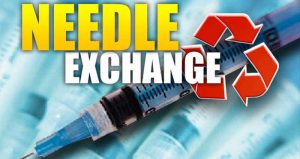
April 20, 1998: Donna Shalala, Secretary of the U.S. Department of Health and Human Services, determined that needle-exchange programs (NEPs) were effective and did not encourage the use of illegal drugs, but the Clinton Administration did not lift the ban on use of Federal funds for NEPs. (see June 25)
April 20 Peace Love Art Activism
Technological Milestone
April 20, 1999: the Disney film ‘A Bug’s Life‘ was released. It was the first 100% digital DVD. It was transferred directly from the digital source to DVD. (see January 9, 2001)
April 20 Peace Love Art Activism
LGBTQ
Connecticut
April 20, 2005: Connecticut Governor Jodi Rell signed a civil union bill into law, affording same-sex couples some – but not all – of the projections that marriage provides. (see Sept 6)
National Organization for Marriage
April 20, 2015, LGBTQ: the U.S. Supreme Court refused to hear one last legal attempt by the National Organization for Marriage to overturn a federal judge’s ruling allowing gays and lesbians to marry in Oregon. The high court’s action came nearly a year after U.S. District Judge Michael McShane of Eugene on May 19, 2014, struck down Oregon’s voter-approved constitutional amendment prohibiting same-sex marriage. (see Apr 28)
April 20 Peace Love Art Activism
Cannabis
April 20, 2006: the FDA released a statement titled “Inter-Agency Advisory Regarding Claims That Smoked Marijuana Is a Medicine.” The FDA stated that “there is currently sound evidence that smoked marijuana is harmful. A past evaluation by several Department of Health and Human Services (HHS) agencies… concluded that no sound scientific studies supported medical use of marijuana for treatment in the United States, and no animal or human data supported the safety or efficacy of marijuana for general medical use…” (Procon.org article) (see June 21)
April 20 Peace Love Art Activism
Deepwater Horizon Oil Spill
April 20, 2010: an explosion at the Deepwater Horizon oil rig killed 11 workers, caused the rig to sink two days later, and caused a massive offshore oil spill in the Gulf of Mexico. (Offshore Tech site timeline) (see Apr 24)
April 20 Peace Love Art Activism
Death Penalty
April 20, 2017: Arkansas executed Ledell Lee, 51, who was sentenced to death in 1995. (NYT article) (see Apr 24)
April 20 Peace Love Art Activism
Immigration History
April 20, 2020: President Trump announced a plan to close the United States to people trying to come to the country to live and work. He justified the drastic move as a necessary step to protect American workers from foreign competition once the nation’s economy begins to recover from the shutdown caused by the coronavirus outbreak.
“In light of the attack from the Invisible Enemy, as well as the need to protect the jobs of our GREAT American Citizens,” Trump wrote on Twitter. “I will be signing an Executive Order to temporarily suspend immigration into the United States!” (next IH, see April 21); ban lifted, see February 24, 2021)
April 20 Peace Love Art Activism
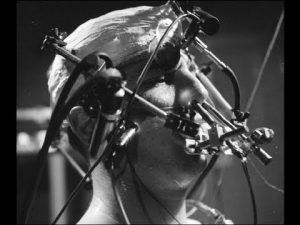 April 20, 1950: the CIA’s behavior-control program project BLUEBIRD officially began. CIA Director Roscoe Hillenkoetter approved the behavior-control program (the predecessor to Project ARTICHOKE) and authorized the use of unvouchered funds to pay for its most sensitive areas. At this point, LSD was not known to the CIA. (LSD, see August; Red Scare, see April 29)
April 20, 1950: the CIA’s behavior-control program project BLUEBIRD officially began. CIA Director Roscoe Hillenkoetter approved the behavior-control program (the predecessor to Project ARTICHOKE) and authorized the use of unvouchered funds to pay for its most sensitive areas. At this point, LSD was not known to the CIA. (LSD, see August; Red Scare, see April 29)
